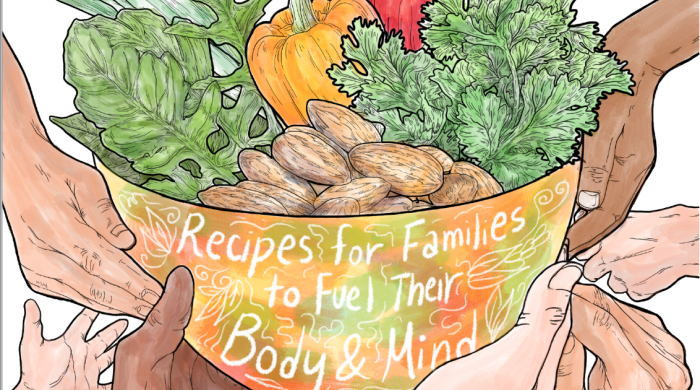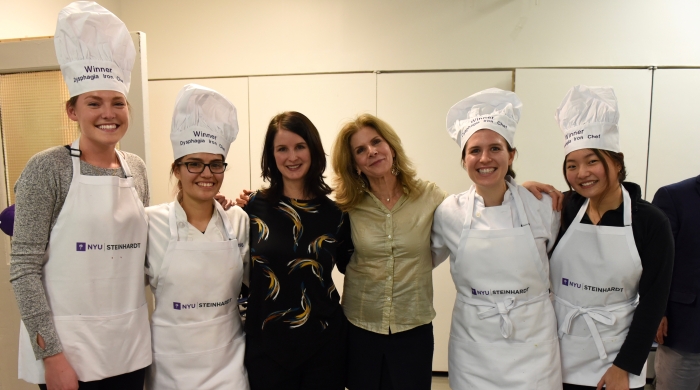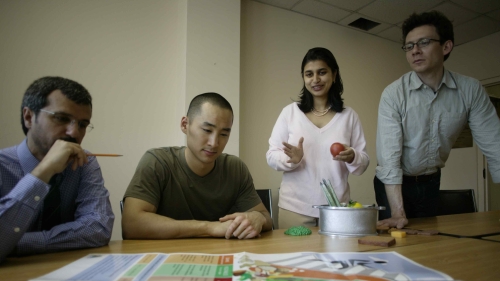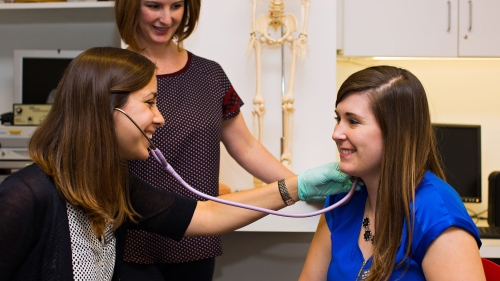At NYU Steinhardt, students from the Communicative Sciences and Disorders (CSD) and Nutrition and Food Studies (NUTR) departments are learning how to take better care of their future patients and clients by working together – even from across the country.
“Interdisciplinary Case-Based Management of Dysphagia” is a joint CSD/NUTR course taught over NYU’s two-week January intersession, or J-Term. This highly hands-on class allows students to emulate the professional interactions they may experience in the field while working with individuals who have dysphagia, or swallowing difficulties.
“The uniqueness of this course is its interdisciplinary nature,” says Lisa Sasson, clinical professor and associate dean for global affairs and experiential learning, who co-teaches the class. “In hospitals and medical centers, professionals of different backgrounds work together while looking through their own lens, and we want to make sure our students get that experience.”
Students in the course are organized into interdisciplinary groups and given case studies of fictional patients with dysphagia, including an active teenager who had a snowboarding accident and a five-year-old who had a brain tumor removed. Together, the groups collaborate on the best and safest ways to not only achieve their patients’ nutritional and hydration goals, but to also improve their quality of life.
“We include pictures of these simulated patients at the very beginning, because we want students to feel a connection to them and their families,” says Sasson. “It’s very important to see patients as individuals, as human beings, and what connects people together more than their food and their culture?”
“When I was an NYU Steinhardt Dietetic intern, I always felt so bad for patients on pureed or soft/minced diets because everything looked so unappetizing,” says Yasaman Vojdani, who graduates with her MS in Clinical Nutrition and Dietetics this Spring. “Through this course, we got to focus on how you present food so it’s appealing to look at and taste. It was a great exercise to be more creative, but also to think about what’s doable for a patient once they go home so they can continue their successful recovery.”
Online Students Welcome
This year, the course was opened to online students for the very first time, creating what the instructors call “an accidental pilot program.”
“Steinhardt is such a diverse place, and this course allowed us the opportunity to really unite people from different programs and backgrounds for a common goal,” says Erin Embry, clinical associate professor and associate dean for academic operations, who is the course’s other co-teacher. “One value of including online students, many of whom are returning to school following a career change or later in their lives with additional life demands, is that they bring with them many real-world perspectives that benefit other students in the classroom setting.”
“I’ve always wanted to work as a speech-language pathologist (SLP),” says Judith Jarka, who takes her online Master of Science in Communicative Sciences and Disorders courses from her home in Illinois. “But when my twins were born at 26 weeks and were in the neonatal intensive care unit (NICU) for months needing a lot of care for intestinal issues, I realized even more the impact that a good SLP can make for the pediatric population.
After Jarka couldn’t secure a medical placement near her, she knew this course would give her that interdisciplinary interaction she was looking for.
“My group and I received the pediatric case study for the five-year-old girl, with which we were tasked to consider many real-life challenges that can occur post-op for inpatient clients, as well as sensory issues and strong food preferences around taste and texture,” says Jarka, who hopes to work as an SLP in a NICU/PICU (pediatric intensive care unit) in the future. “Working collaboratively with the nutrition students on creating a comprehensive plan for our patient was such a wonderful and unique experience.”
“While pursuing my undergraduate degree in voice and opera, I had vocal injuries and disorders that led to a lot of therapy with SLPs and surgery,” says Eleanor Steinmetz, another online CSD student. “I decided to switch my focus from pursuing a Master of Music and instead work on destigmatizing the judgment and blame that too many singers face when they have injuries.”
Ultimately, Steinmetz wants to work in an outpatient voice center, where the clientele can include everyone from singers and professional voice teachers to those who use their voice for their profession, such as lawyers, teachers, or comedians.
“I want to be a voice therapist because I know how it feels to have something so innately connected to you be taken away,” says Steinmetz, whose case study patient was an Italian chef receiving chemotherapy for throat cancer. “When patients have dysphagia, it’s another example of having a huge part of their life disrupted. This class gave us the chance to think about how people can eat safely while also enjoying their experience.”
The class culminates in an in-person “Dysphagia Iron Chef” cooking challenge in New York City. The five student groups planned and prepared a meal to meet their case study patient’s nutritional, cultural, and taste preferences, as well as their medical needs, which are then judged by a panel of faculty experts and researchers in the departments of CSD and NUTR.
This year’s judges included Sonja Molfenter, associate professor in CSD; Brynn Jones-Rastelli, a PhD student in Molfenter’s NYU Swallowing Research Lab; and Monica Salinas, a registered dietitian with specialty in critical care as well as an adjunct instructor in NUTR and clinical preceptor for the NYU Dietetic Internship.
Student presented dishes such as a ground turkey and rice burrito bowl with a high-protein fruit smoothie and chocolate pudding; a flaked pesto salmon over lightly blended mushroom risotto with espresso pudding and thickened grape juice to simulate wine; and a cauliflower macaroni and cheese that was pureed and piped to give the consistency and look of noodles.
“Even though this course includes such diverse students, they learn so much from each other that sometimes you forget who is from CSD and who is from NUTR,” says Sasson. “Everyone came together so cohesively and the feedback from the online students has been overwhelmingly positive. We hope to continue to think of more creative ways to provide these kinds of real-world experiences to all our students at Steinhardt.”
Related Articles
New Cookbook from Nutrition and Art Therapy Students Encourages Families to Get Creative in the Kitchen
"Creative Kitchen," a joint project created by Art Therapy and Nutrition and Dietetics students, combines healthy, low-cost recipes with arts-based activities to bring families together during this time of crisis.
CSD and Nutrition Students Team Up for Iron Chef Competition
What do mashed potatoes, black bean soup, and coconut flan have in common? Not only are they foods easy for individuals with dysphagia, a swallowing disorder, to consume, but they are also dishes recently prepared by master’s students from the NYU Steinhardt Department of Communicative Sciences and Disorders and Department of Nutrition and Food Studies taking “Interdisciplinary Case-Based Management in Dysphagia.”
Communicative Sciences and Disorders Comes Together Like Never Before
Department moves into new office and research space at 665 Broadway.





